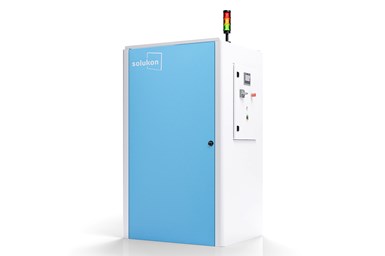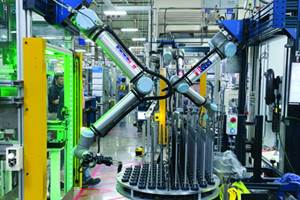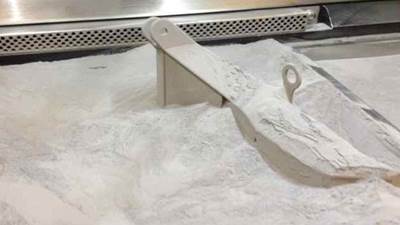Solukon’s Metal Powder Collection Unit Offers Simple, Safe Material Handling
With the SFM-PCU integrated into the additive manufacturing system, users no longer have direct contact with the powder material during depowdering — the powder remains in a closed system at all times.
The Solukon Powder Collection Unit (SFM-PCU) is a fully automated powder collection solution for metal powder, offering simple, safe and fast powder handling after depowdering.
During automated depowdering in accordance with Solukon SPR technology, the powder collects in the hopper at the bottom of the Solukon SFM-AT1000-S. With the help of an integrated vacuum conveyor system, the SFM-PCU vacuums up the powder at a sensor-monitored transfer point. It then goes through a hose and is gently transported into a large container. From there, the contaminated material can be transferred through a neutral interface to a recycling station or the like, where it is made available for further printing processes.
The container is rollable and can be exchanged during the process. The filling level inside the container is scanned by a sensor and can also be checked through large inspection windows. Because of the direct digital connection to the Solukon depowdering system, users always have a real-time overview of the process status.
When the SFM-PCU is integrated into the system, users no longer have direct contact with the powder material during depowdering — the powder remains in a closed system at all times. “This makes it possible to meet the most stringent occupational health and safety requirements and achieve a new milestone on our path towards a dust-free factory,” says Benedikt Lutzenberger, head of the SFM-PCU powder collection unit project.
Because the powder no longer has to be ejected manually, larger quantities of powder can be transported away more quickly, making the depowdering process even more efficient. Emptying and subsequently cleaning the Solukon depowdering system is also easier.
The powder collection unit is designed for a particularly high volume of powder, which makes it a well-suited peripheral for Solukon systems in both the large part segment (SFM-AT1000-S and, depending on the application, SFM-AT800-S as well) and for automated serial production. Because the container at the unit has a substantial volume of over 100 L, one peripheral unit can be coupled to up to three single-material Solukon systems.
Inside its powder collection unit, Solukon relies on a vacuum conveyor from the Swedish company Piab. The conveyor used in the SFM-PCU is highly efficient, reliable and easy to service, meeting all of Solukon’s requirements and expectations.
- Learn about another Solukon postprocessing offering with its expanded compatibility of a unpacking, cleaning station for plastic parts. With adapters for EOS P 1 and P 5 series SLS manufacturing systems, the Solukon SFP770 postprocessing system can now accommodate build boxes from other leading printers, enabling Solukon to tap new markets in the area of polymer postprocessing.
- Read about Solukon’s SPR-Pathfinder software for automatic depowdering. It is said the algorithm-based SPR-Pathfinder calculates the ideal motion sequence for the most complex geometries, finding the best path to enable the powder to flow out completely.
Related Content
UltiMaker Targets Light Industrial Applications With 3D Printer Designed for the Factory Floor
The company’s Factor 4 3D printer introduced this week is designed to complement conventional manufacturing equipment including CNC machining and automation.
Read MoreHow AM Enables Cobot Automation for Thyssenkrupp Bilstein (Includes Video)
The shock absorber maker has responded to its staffing shortages through extensive use of collaborative robots. In-house 3D printing makes this possible by providing the related hardware needed to complete the cobot-automated cells.
Read MoreHow Avid Product Development Creates Efficiencies in High-Mix, Low-Volume Additive Manufacturing
Contract manufacturer Avid Product Development (a Lubrizol company) has developed strategies to streamline part production through 3D printing so its engineering team can focus on development, design, assembly and other services.
Read MoreVideo: 3D Printed Tooling Eases Cobot Integration
At NPE 2024, Universal Robots and EMI Corporation highlighted how 3D printed end effectors, fixtures and more enable adoption of collaborative robots.
Read MoreRead Next
3D Printed Polymer EOAT Increases Safety of Cobots
Contract manufacturer Anubis 3D applies polymer 3D printing processes to manufacture cobot tooling that is lightweight, smooth and safer for human interaction.
Read MorePostprocessing Steps and Costs for Metal 3D Printing
When your metal part is done 3D printing, you just pull it out of the machine and start using it, right? Not exactly.
Read MoreProfilometry-Based Indentation Plastometry (PIP) as an Alternative to Standard Tensile Testing
UK-based Plastometrex offers a benchtop testing device utilizing PIP to quickly and easily analyze the yield strength, tensile strength and uniform elongation of samples and even printed parts. The solution is particularly useful for additive manufacturing.
Read More





















